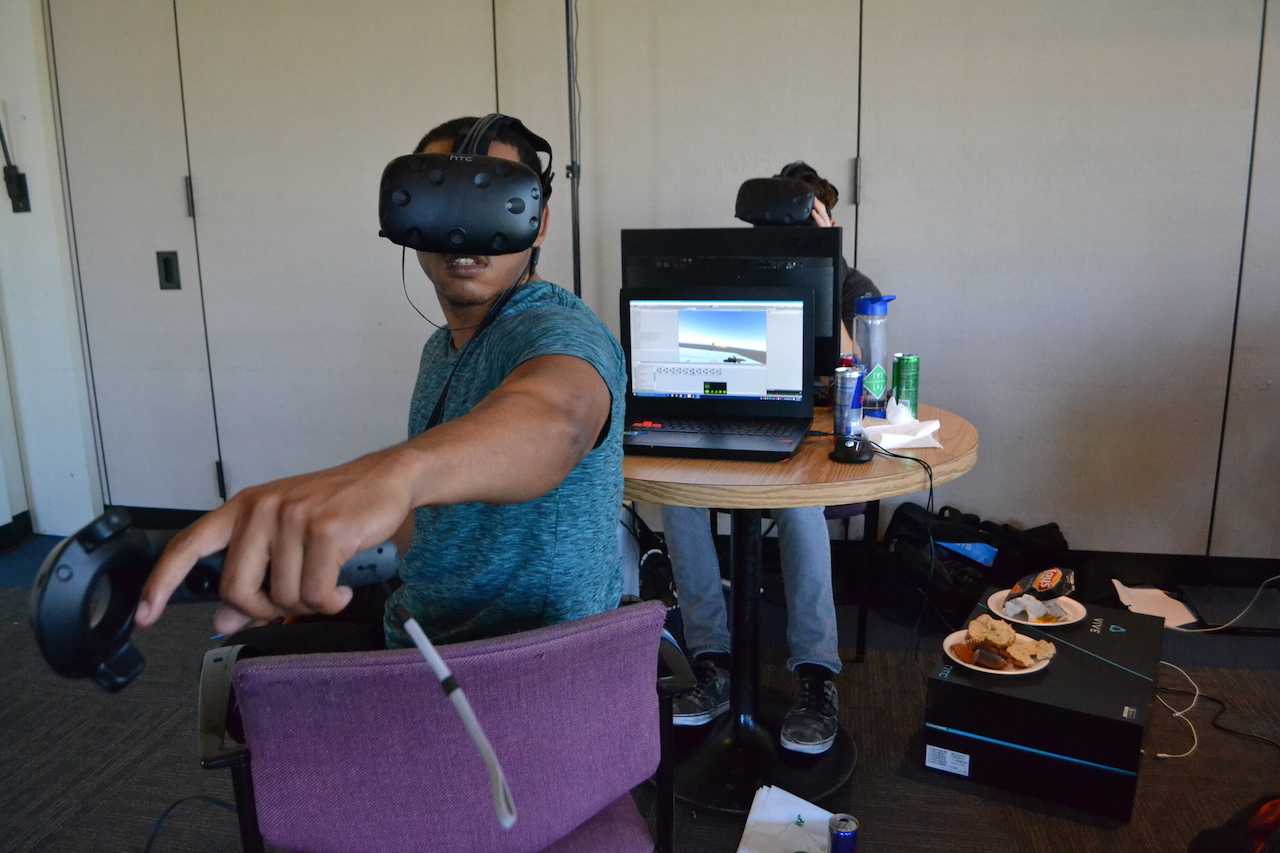Musk still lingers in the University Student Union ballrooms from the hundreds of computer and electrical engineering students who spent the night in the auditorium for Beach Hacks.
The 24-hour hackathon invited students of varying specialties and skill sets to gather and create. From April 22-23, students worked through the night on a newly started project, with the intention of showing a prototype to the judges once the 24-hour window closed.
Students came in teams, or they came alone, ready to form teams. Some came with the intent to build a new piece of hardware, others wanted to produce software – all fair game at Beach Hacks.
“There are some submission categories, but otherwise it’s really open to what you can do.” Hari Gandhi, a senior electrical engineering student. “A lot of people make apps and software.”
But Gandhi and his teammate, junior electrical engineering student Jordan Hsu, built a light-up motorcycle jacket. A light strip stretches across the arms and torso of the prototype. It glows red for the brakes, or flashes yellow on either side for the turn signal.
“Well, it’s a T-shirt right now,” Hsu said. “When it’s a finished product it would be all integrated, so it would just be the normal motorcycle controls, but we would be pulling the signals,” Gandhi added.
He said that there are two main reasons for coming to a hackathon like this, the other, knowledgeable people who might be able to help, and the equipment that is at their disposal.
“All these VR goggles and things people got going on, normally to buy that it’s $3-4,000,” Gandhi said. “So, it really restricts your opportunity to develop apps for that platform — but by coming here you can develop on it for free.”
People like junior computer science major, Luis Pedroza-Soto came without a team, and ended up joining with computer science senior, Greg Violan who had a team working on a phone game. In the game, the avatar is controlled using the phone’s motion detectors.
“Pretty simple — all you’re doing is picking up debris from the ocean, and it’s all mostly recyclable stuff,” Pedroza-Soto said. “So you’ll see a lot of trash, newspapers, aluminum cans, you know, stuff you can recycle, in attempts to raise awareness for recycling and Earth Day.”
Other students brought their ideas in to get help, like senior mechanical engineering students Will Hovik and Diego Aguilar, who built a camera that prints on thermal paper.
“We like photography a lot and I have a lot of cameras,” Hovik said. “I really like taking pictures, but I don’t like printing them out because it’s so expensive”
They made the plans for this prototype when they first began theorizing a senior design project, but chose to cram all the building into a 24-hour period.
“We learned a lot here [from] other students that are working on projects. So, we wanted the resources mainly, and like the people resources rather than the hardware,” Hovik said. “Things that we didn’t have expertise in, we knew coming here, the people here could help us out,” Aguilar added.
The overall victor of the weekend came from UC Riverside. A group called Deep Music, made up of sophomore computer science majors, Joshua Pedon, Jae Hyun Yim, Justin Yoo and Ishan Agrawal, took away first prize for its Deep Music software.
The app is based off of photography app Deep Art, which allows users to use an artist’s signature style as a photo filter. Well, instead of artwork, the team demonstrated how their program can take the melodies of “Mr. Brightside,” and with the click of a button, turn The Killers into EDM.
With the clock ticking down on Beach Hacks, an abundance of intuitive prototypes began manifesting. Though only a few teams were awarded, the judges encouraged all teams to keep working on their projects. Some of these ideas may be worth a lot more than first prize in a contest.




